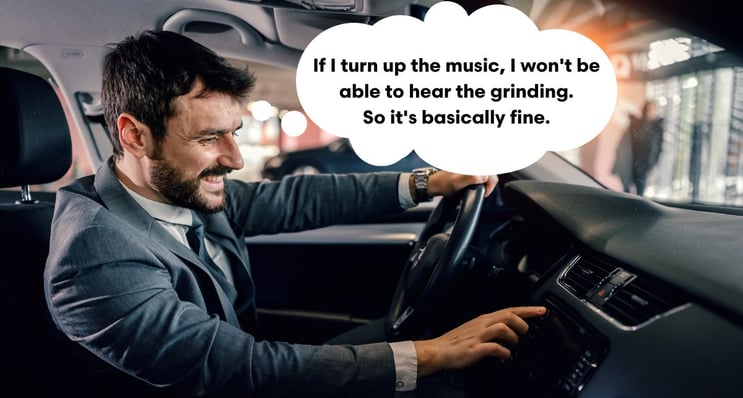If your car is making any sound other than the typical operating noises, you probably have some issues with your vehicle. In order to help your avoid expensive auto repairs it's good to proactively listen to what your car is telling you. Keeping an ear out for unusual sounds in your car can help you identify potential problems early and prevent costly repairs. Here are some common car sounds and what they may indicate:

1. Squealing or screeching
If your car is making a high-pitched squealing or screeching noise, it's likely that your brakes need attention. This noise may be caused by worn brake pads, which can cause damage to the rotors and other brake components if left unchecked. In Alberta, screeching when stopping could indicate some particulate like sand or dirt being trapped in your brakes. It can make a rather uncomfortable noise.
2. Grinding
A grinding noise usually indicates one of three things. A faulty wheel bearing or hub assembly, a component that needs fluid does not have it, or the brakes are very much worn out. All three of these issues can be very hazardous to drive with and you should seek immediate mechanical help. A faulty wheel bearing in extreme cases can result in your wheel seizing. Not having fluid in components may result in costly damage to your vehicle. The risk of having worn out breaks is quite obvious. If you hear a grinding sound coming from your vehicle, you should seek mechanical help as soon as possible.
3. Knocking or ticking
If your car is making a knocking or ticking noise, it's likely that you have low oil pressure. This noise is caused by a lack of lubrication in the engine, which can cause damage to the engine if left unchecked. You should seek mechanical attention sooner than later. This will usually be accompanied by a check engine light also.
4. Hissing
A hissing noise can be a sign of a leak in the cooling system. This can be caused by a leak in the radiator, hoses, or water pump, and it should be addressed as soon as possible to prevent engine damage. Depending on where the sound is coming from, it could also indicate the air leaving a tire or air a leak in the air conditioning system.
5. Whining
A whining noise can be caused by a worn-out power steering pump or low power steering fluid level. This noise can be heard when you turn the steering wheel and it should be addressed as soon as possible to prevent damage to the steering system. Whining can also come from a drive belt that is wearing out. A worn belt should be replaced before it has the chance to snap.
6. Rumbling or roaring
A rumbling or roaring noise coming from the wheels can be a sign of worn-out wheel bearings. This noise can be heard while driving, especially when going over bumps or curves. It could also be the sound of a plastic undercarriage panel dragging on the ground. If you don't see any dragging components, it is likely that a suspension component is not functioning properly.
7. Rattling
A rattling noise can be caused by loose or broken parts, such as the heat shield, muffler or exhaust hanger, and it can also indicate a problem with the suspension.
8. Whirring
A whirring noise can be an indication that your vehicle has a problem with either the alternator or battery. This will usually be accompanied by a battery light on the dash. Getting your battery tested or your charging system inspected could save you from getting stranded.
Conclusion
It's important to note that some sounds may be normal for certain cars, but it's always better to have your car checked by a professional if you notice any unusual sounds. Regular maintenance and inspections can help prevent small problems from becoming bigger, more expensive issues.
In conclusion, being aware of the different sounds your car makes and what they may indicate can help you take action early and save you money in the long run. If you're unsure what a noise is or what it may indicate, it's always best to consult a professional mechanic. This is not an all encompassing list. If your vehicle is making one of these noises, it may have other issues associated with it that are not listed above.






